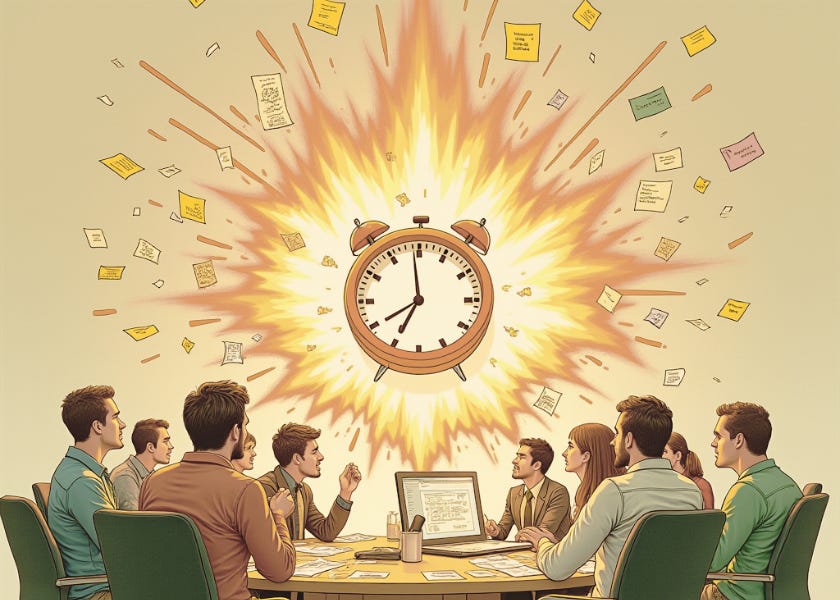Why Meetings Overrun: Solve Your Company's Biggest Time Drain
4 Common Pitfalls and How to Avoid Them
Meetings serve as a barometer of a company's leadership, strategy, and culture. When they run efficiently and achieve their objectives, they demonstrate organizational clarity and respect for people's time. By contrast, when they consistently overrun, it's often a symptom of deeper challenges.
Through analysis of experiences shared by team leaders and managers, we've identified four key reasons meetings tend to overrun, along with practical solutions to keep them on track.
1. Prep? What prep? 🤷
Insufficient Pre-Meeting Preparation
When attendees haven't reviewed necessary materials beforehand or aren't clear on the meeting's objectives, valuable time is spent getting everyone up to speed rather than making progress toward the intended outcome.
How to fix it:
Share context and documentation ahead of time, with clear expectations for pre-meeting review.
Create effective invitations that clearly communicate the purpose, expected outcomes, and any pre-work required.
For decision-making meetings, distribute relevant information and options beforehand, setting a clear deadline for initial feedback and comments.
2. The Homogenous Pudding 🍮
Lack of Thoughtful Meeting Design
Many meetings lack the structure they need to deliver their intended outcomes. This shows up when trying to accomplish too much in one session - like combining detailed debate with final decision-making, or mixing updates with strategic planning.
How to fix it:
Build an effective, engaging, and inclusive meeting structure before you send the invite.
Create focused agendas with specific timeboxes for different components.
Construct powerful questions that will engage the team's best thinking.
Plan ahead for how meeting content will be captured and shared.
Break complex objectives into separate sessions when needed.
3. The Wild West 🤠
Poor Meeting Facilitation
Even well-designed meetings can derail without skilled facilitation. Watch for discussions that veer off-topic, dominant voices taking over conversations, or groups that struggle to reach clear conclusions despite lengthy debate.
How to fix it:
Keep conversations aligned with the stated objectives and redirect when needed.
Actively manage group dynamics and address harmful behaviors in the moment.
Use facilitation techniques like round-robins, dot voting, or parking lots to create more productive discussions.
Regularly summarize what you're hearing to identify points of alignment and outstanding disagreements.
4. The Squeeze 🍋
Unrealistic Time Estimation
Many meetings are simply scheduled for less time than they realistically require. This often stems from wishful thinking rather than working backwards from the desired outcome to account for all necessary steps.
How to fix it:
Start with your intended outcome and map backwards through every discussion and decision point needed to get there.
Add buffer time between agenda items - conversations rarely wrap up exactly when planned.
Consider whether you're trying to fit a 90-minute conversation into a 60-minute slot.
Remember that decision-making takes longer than information sharing.
The Real Impact of Better Meeting Management
Addressing these common causes isn't just about ending on time; it's about organizational effectiveness. According to Harvard Business Review research, 70% of meetings keep employees from doing productive work, while only 30% of meetings are considered productive. When organizations become more deliberate about when and how they meet, the time savings can be substantial. To take one relevant example, executives alone spend nearly 23 hours a week in meetings, up from less than 10 hours in the 1960s.
More importantly, well-structured meetings create better outcomes. This isn't just about saving time. It's about making better decisions, communicating more clearly, and keeping teams engaged rather than frustrated.
When your meetings consistently start on time, stay focused, and end with clear outcomes, you're not just being efficient. You're demonstrating the kind of organizational health that shows up in measures of everything from employee satisfaction to strategic execution.
Can we help you?
We’re developing a tool for meeting design to use in conjunction with our Fix Your Meetings Workshop. If you’re interested in getting access to the beta test of the tool, the workshop or both, please add your details here and we’ll be in touch.




